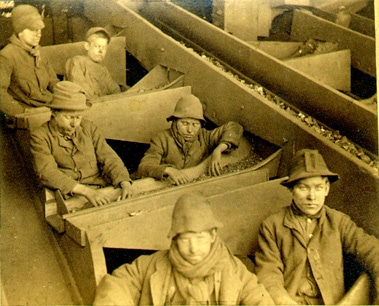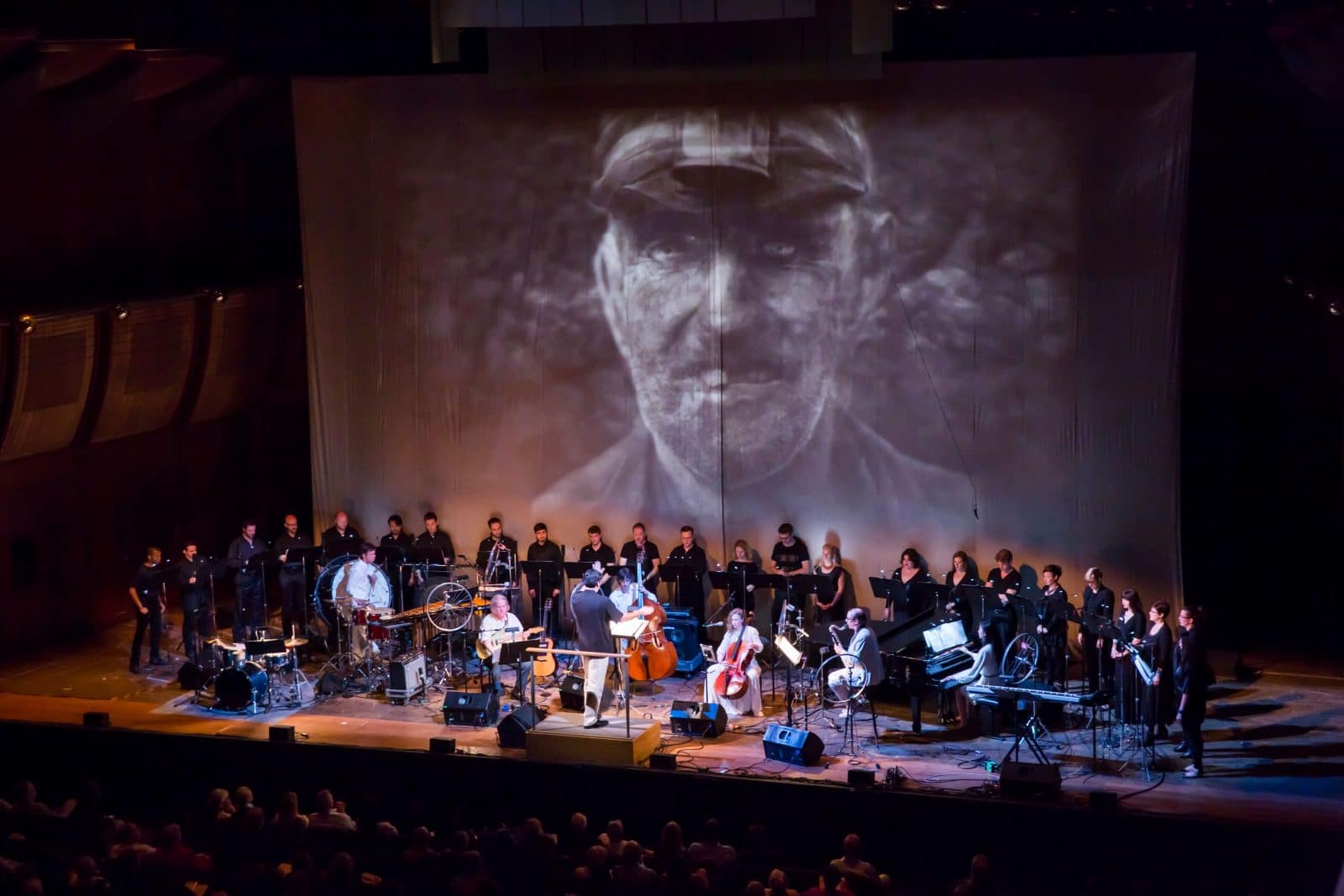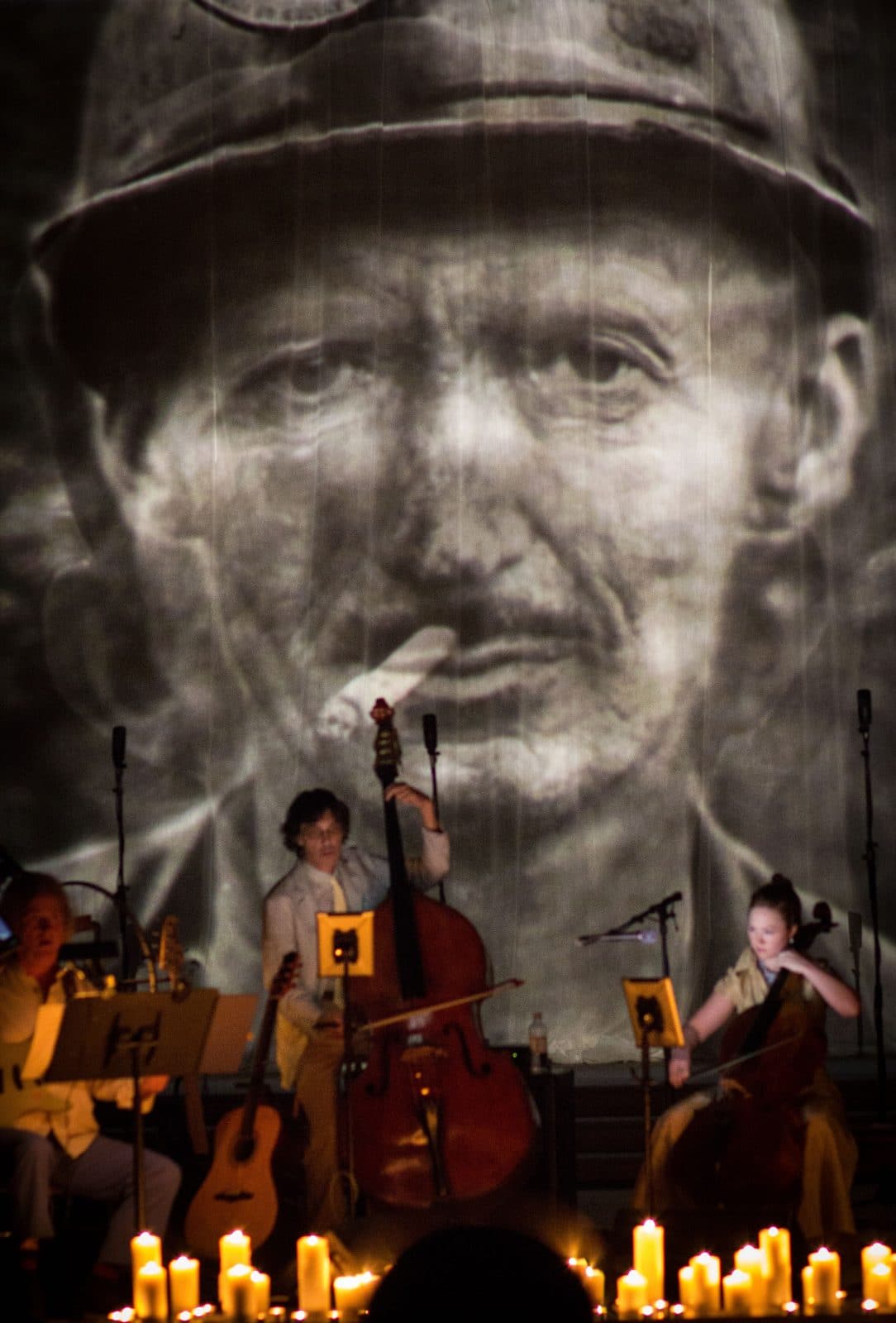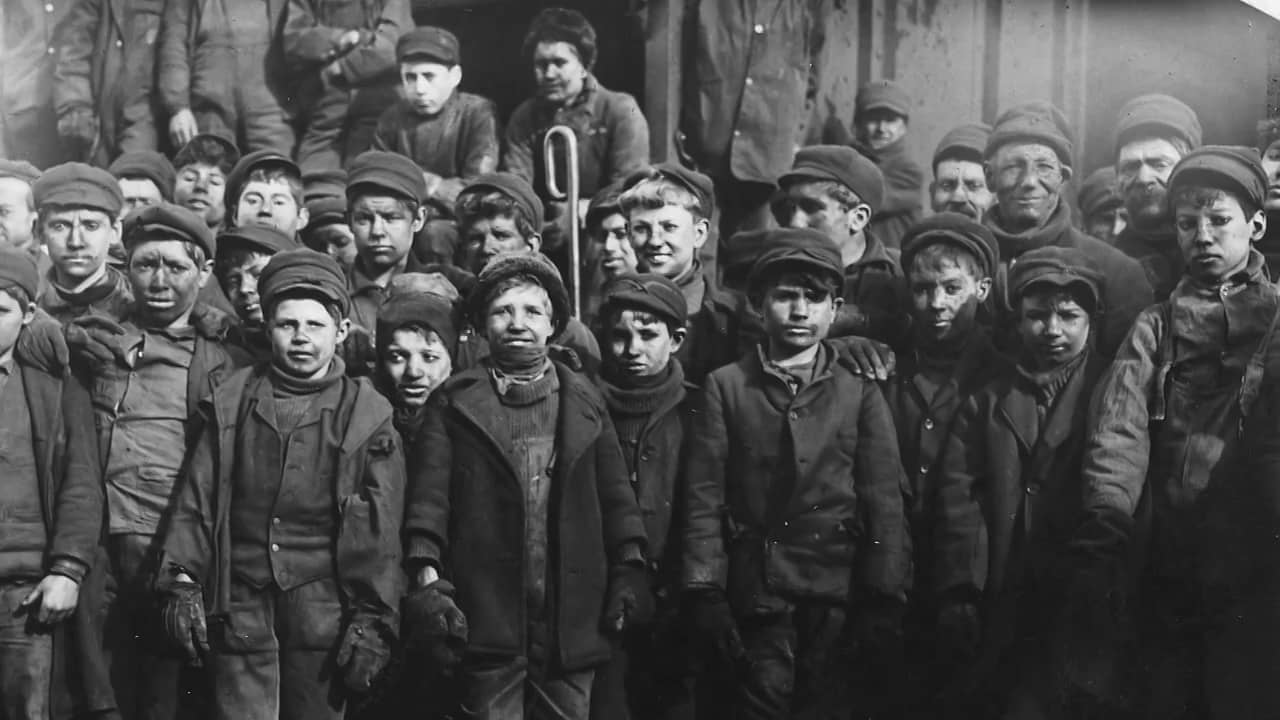De Amerikaanse componist Julia Wolfe (1958) heeft wat met de sociale geschiedenis van haar vaderland. Steel Hammer reflecteert op de ongelijke strijd van mens versus machine, zoals beschreven in de volksballade John Henry. Anthracite Fields zoomt in op het zware leven van mijnwerkers in Pennsylvania. Ze won er in 2015 een Pulitzer Prize mee. Het avondvullende oratorium beleeft twee juli zijn Nederlandse première in de Haarlemse Koorbiënnale. Daniel Reuss dirigeert Bang on a Can All Stars, Cappella Amsterdam en Utrechtse Studenten Cantorij in Muziekgebouw aan ‘t IJ.
Nog voor ik haar één vraag gesteld heb, barst Wolfe lost in een enthousiast betoog. Ik moet vooral niet vergeten dat de visuals van Jeff Sugg fenomenaal zijn. ‘Hij heeft dezelfde research gedaan als ik en we vonden schitterende foto’s van mijnwerkers. Vooral die van Lewis Hine van de zogenoemde breaker boys zijn indrukwekkend. Dat waren kinderen die zittend in een soort schuitje het antraciet moesten zuiveren van ongerechtigheden. – Met hun blote handen. Eigenlijk vond Jeff de beelden te direct, maar ze waren te krachtig om niet te gebruiken. Samen met kaarten, advertenties en andere zaken vormen zij een verdiepende laag bij mijn stuk.’

Piepklein museum
Toen dirigent Alan Harler haar vroeg een stuk te schrijven voor zijn Mendelssohn Club, besloot Wolfe onmiddellijk iets te doen met haar eigen achtergrond. ‘Het koor is gevestigd in Philadelphia en dit was mijn eerste opdracht ooit uit de staat Pennsylvania, waar ik opgroeide. Daar lag begin twintigste eeuw het hart van de Amerikaanse mijnindustrie, geconcentreerd rond Scranton. Mijn grootmoeder was daar opgegroeid. Ik besloot er een avondvullend stuk aan te wijden à la Steel Hammer, opnieuw samen met Bang on a Can.’
‘Als kind woonde ik op twee uur rijden van het mijnbouwgebied, in een dorpje midden in de bossen. Toch wist ik er hoegenaamd niets van, dus ik besloot op onderzoek uit te gaan. Ik sprak met oud-mijnwerkers, las krantenartikelen en verslagen en bezocht het Pennsylvania Anthracite Heritage Museum. – Een piepklein gebouwtje in de middle of nowhere, alleen te bereiken via kronkelige landweggetjes. Drie curatoren vertelden over hoe het mijnwerkersleven eruit zag, toonden foto’s, geografische diagrammen, landkaarten en dwarsdoorsneden van aardlagen. Uiterst boeiend. Ook Jeff vond er veel nuttig materiaal.’

Aardedonkere mijnschacht
Een bezoek aan een kolenmijn mocht uiteraard niet ontbreken. ‘Dat is niet iets voor mensen met claustrofobie’, lacht Wolfe. ‘Samen met oud-mijnwerkers daal je af in een soort treinkarretje, langs het spoor dat zij destijds zelf gebruikten. Eenmaal beneden voeren ze je door verschillende tunnels en passages. Voor hen was het een zware en harde werkelijkheid, maar als bezoeker is het prachtig. De wanden glimmen, er zijn kleine medische hulpposten en je kunt zien hoe diep ze in de aardlagen doordrongen. Als ze plotseling het licht uitdoen, weet je niet wat je overkomt. Het is aardedonker, je ziet letterlijk geen hand voor ogen.’
Dolend door de ondergrondse ruimten kwamen als vanzelf muzikale ideeën op. ‘Als je aan het onderzoeken en verzamelen bent, ben je super bewust. Sommige klanken zijn in het stuk terechtgekomen als reactie op wat ik zag, andere zijn direct gerelateerd aan die ruimtes. Je hoort het geraas van boren en het geratel van karretjes, van gassen die ontsnappen of een alarm dat afgaat. Er waren veel gevaarlijke situaties, dan moesten de werkers zo snel mogelijk de mijn uitvluchten.’
Auditieve gedenksteen
Dit lukte niet altijd en in de loop der tijden vielen er vele slachtoffers. ‘Ik stuitte op de Pennsylvania index of mining accidents. Pagina’s en pagina’s vol namen van mannen die misschien niet gestorven, maar op zijn minst gewond waren geraakt.’ Wolfe besloot deze vast te leggen in een soort auditieve gedenksteen. ‘Maar het waren er zoveel! Ik begon met eenlettergrepige namen als John en Frank, maar nog waren het er te veel. Uiteindelijk beperkte ik me tot Johns met een eenlettergrepige achternaam. John Ash, John Ayres, John Chain, als je dat afwisselend zingt ontstaat vanzelf een sterk ritme.’

De namen klinken in het eerste deel, ‘Foundation’, tegen een achtergrond van oorverdovend (elektronisch) geraas en gebonk. Wolfe: ‘Het was behoorlijk emotioneel die namen te verklanken; elk van hen representeert immers iemands grootvader, vader, broer of oom. Dat blijkt ook wel uit de enorme respons op Anthracite Fields. In elke stad in Amerika waar we het speelden kwamen na afloop mensen naar me toe. In Los Angeles – bepaald geen mijnwerkersgebied – zei een vrouw: mijn grootvader staat op uw lijst, John Coyne. Ik kreeg kippenvel, dat is inderdaad een zelden voorkomende spelling.’
Draaiend fietswiel
In het tweede deel, ‘Breaker Boys’ richt Wolfe een monument op voor de jongens die al net zulke zware arbeid verrichtten als de volwassenen. ‘Om nauwkeuriger te werken mochten ze geen handschoenen dragen, dus hadden ze vaak bloedende vingers. Toch stelde ik me voor dat ze ook wel eens plezier maakten, het blijven jongens tenslotte. Dit deel zit vol energie, met ratelende houten percussie, een draaiend fietswiel, volkswijsjes en een jolig-duister rijmpje over Micky Pick-Slate.’

Hoewel Wolfe nadrukkelijk stelt geen politiek statement te willen maken, citeert ze in het hierop volgende ‘Speech’ een bekende vakbondsman. ‘Ik zag op YouTube filmpjes van John L. Lewis, die tekeer ging tegen de misstanden in de mijnen. Hij was een bevlogen spreker van het type dat we tegenwoordig node missen. – “If we must grind up flesh and bones in this industrial machine we call America…”. Ongelooflijk, het is bijna poëzie. Toen ik dat hoorde wist ik: dit móet in het stuk.
Zee van kleur
Als tegenwicht smokkelde Wolfe ook een vrouwelijk element binnen. ‘Het werd allemaal zo zwaar en guy heavy. Maar ik sprak ook Barbara Powell, wier vader en grootvader mijnwerkers waren. Ze groeide op in een door het bedrijf gebouwde patch town: een verzameling minuscule arbeidershuisjes. De mensen leidden zo’n beperkt, armoedig leven, maar desondanks was Barbara de zonnigste persoon die ik ooit ontmoet heb. Ze deelde trots en liefdevol haar herinneringen, onder andere aan haar tuin. Spontaan ging ze allemaal bloemennamen opsommen. Je ziet het voor je: die armzalige, sombere huisjes, in de lente opeens badend in een zee van kleur. – Dat moest ook in het stuk, want weliswaar was het leven hard, maar het was niet uitsluitend kommer en kwel.’
Muziekgebouw aan ’t IJ 2 juli 15.00 uur: Julia Wolfe: Anthracite Fields, info en kaarten.
